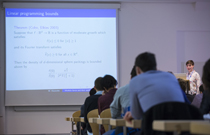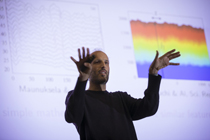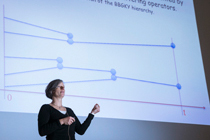
What is the concept behind MATH+ Fridays?
The Friday colloquia represent a common meeting point for Berlin mathematics: a colloquium with broad emanation that permits an overview of large-scale connections and insights. In thematic series, the conversation is about “mathematics as a whole,” and we hope to be able to witness some breakthroughs. Hardly anyone knows that Grigory Perelman first presented his famous proof of the Poincaré Conjecture to the mathematical public in Berlin, at the PhD student seminar meeting of professors Huisken and Ecker at FU Berlin.Behind the scenes at MATH+ Fridays, a number of seminars, workshops, courses, and conversation opportunities are on offer. For instance, the lunches prior to the “Sophia Kovalevskaya Colloquia” are a place to discuss the career paths of successful women in mathematics. Seminars and courses that BMS students can request will discuss such topics as presentation training, good scientific practice, time management and science communication.
All MATH+ Friday speakers receive the "Friday wish list" written by BMS students before their talk.
MATH+ Fridays in the winter semester 2024/25
|
|||||||||||||||||||||||||||
MATH+ Fridays in the summer semester 2025
25 April 2025 - tba16 May 2025 - Euler Lecture
23 May 2025 - tba
13 June 2025 - Richard von Mises Lecture
20 June 2025 - tba
4 July 2025 - Kovalevskaya Lecture
11 July 2025 - Certificate Ceremony and Summer Party
For further seminars and colloquia, see also the Berlin-Potsdam Mathematics Calendar.
On the importance of MATH+ Friday colloquia (written by a BMS student for BMS students)
What makes a good mathematician? To speak in broad generalities, one needs to have a strong mathematical apparatus and a bold vision. It is certain that reproducing elegant proofs and solving problems ensures the development of a mathematical apparatus. On the other hand, shaping a bold vision is a rather subtle matter. In general, a starting point for the development of a bold vision could be a colloquium talk. A talk, which showcases fascinating research results as well as current trends in Mathematics, could stimulate the emergence of new ideas. More specifically, it could be said that such talks leave ”traces” in the brain, which accumulate over time. Just like the effect of a talk is intangible, there is probably no universal measure for the degree of understanding. Certainly, if a talk happens to be very closely related to a person’s specialisation, then more details could be followed, and hence, something similar to the standard measure can be used. However, it would perhaps be too restrictive to say that a talk is understood only if most details are clear. Even an attempt to follow the main story line exposes a person to a fresh perspective. And this could potentially become the source of inspiration. Moreover, such colloquia contribute to our perception of Mathematics in its entirety by offering the chance to think about analogies in different areas.

























